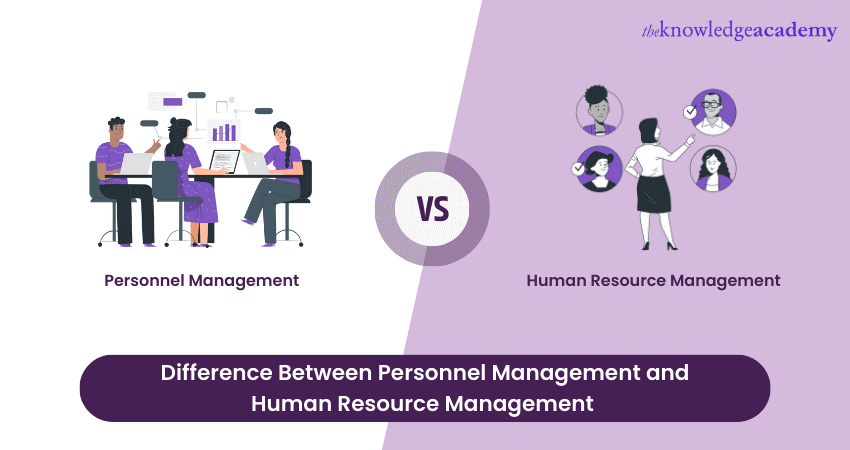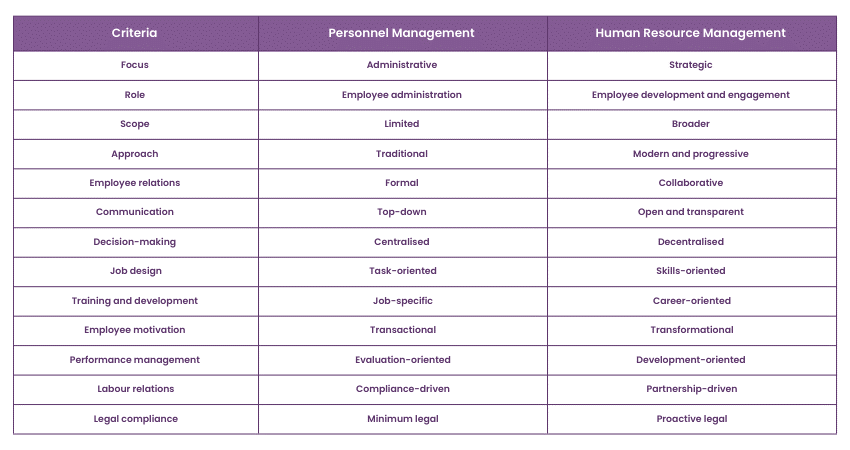We may not have the course you’re looking for. If you enquire or give us a call on 01344203999 and speak to our training experts, we may still be able to help with your training requirements.
Training Outcomes Within Your Budget!
We ensure quality, budget-alignment, and timely delivery by our expert instructors.

When it comes to managing employees within an organisation, Personnel Management and Human Resource Management (HRM) are the two important departments that are responsible for the same. While the role of these separtments may sound similar, there are differences between the two approaches. Personnel Management focuses on administrative tasks, while HRM aligns with an organisation's goals. Want to know how? Explore the Difference Between Personnel Management and Human Resource Management with this blog. Also, learn about their characteristics, roles, and responsibilities.
Table of Contents
1) What is Personnel Management?
2) What is Human Resource Management?
3) What's the Difference Between Personnel Management and Human Resource Management?
4) Similarities between Personnel Management and Human Resource Management
5) Conclusion
What is Personnel Management?
Personnel Management is an established approach to managing employees within an organisation, focusing on various administrative tasks and ensuring the welfare and satisfaction of employees. It encompasses a range of activities aimed at the following:
a) Recruiting
b) Selecting
c) Training
d) Evaluating
e) Maintaining employee relations
Recruitment is a key aspect of Personnel Management. Personnel Managers are responsible for the following:
a) Identifying job vacancies
b) Developing job descriptions
c) Advertising openings
d) Screening applications
e) Conducting interviews, and m
f) Making hiring decisions
Once employees are hired, Personnel Managers continue to play a pivotal role in their development and well-being. They coordinate training programs to enhance employees' skills, knowledge, and abilities. Thus, they ensure that the employees have the necessary tools to perform their jobs effectively. Personnel Managers also conduct performance evaluations, providing feedback and guidance to help employees improve their performance and reach their full potential.
In addition to recruitment and training, Personnel Managers are tasked with managing employee relations. They act as intermediaries between employees and management, addressing any concerns or conflicts that may arise. They also strive to create a positive work environment where employees feel valued and supported, fostering a sense of loyalty and commitment.
Moreover, Personnel Managers oversee employee benefits, such as health insurance, retirement plans, and leave policies. They ensure employees receive fair and competitive compensation packages.
Compliance with labour laws and regulations is another critical responsibility of Personnel Managers. They stay updated on employment laws and ensure the organisation adheres to them. Personnel Managers enforce policies and procedures, maintaining discipline and ensuring employees are aware of their rights and responsibilities. They handle disciplinary actions when necessary, following established procedures and ensuring fairness and consistency.
In Personnel Management, decision-making authority typically rests with top-level management. Personnel Managers act as management representatives, communicating policies and decisions to employees. They also play a role in fostering effective communication and collaboration within the organisation.
While Personnel Management has evolved with the emergence of Human Resource (HR) Management, it remains relevant in certain contexts, particularly in smaller organisations with simpler HR needs. Its focus on administrative tasks, employee welfare, and compliance ensures the smooth functioning of the organisation. As a result, it contributes to a positive work culture.
What is Human Resource Management?
Human Resource Management (HRM) is a comprehensive approach to managing employees within an organisation. It encompasses the following:-
a) Strategic planning
b) Recruitment
c) Employee development
d) Engagement
e) Compensation management
f) Employee relations
With these operations in mind, HRM focuses on aligning the organisation's Human Resources with its goals and objectives.
Strategic planning is a key component of HRM, where HR Managers work closely with top-level management to develop HR strategies that support the organisation's overall strategic goals. This involves analysing the workforce needs, identifying skills gaps, and planning for recruitment, talent development, and succession.
Recruitment plays a vital role in HRM, aiming to attract and select qualified individuals who fit the organisation's culture. HR Managers design recruitment strategies, implement selection processes, and make informed hiring decisions to ensure the right people are in the right positions.
Furthre, employee development is crucial in HRM as it focuses on enhancing employees' skills and knowledge. HR Managers coordinate training programs, provide opportunities for continuous learning, and support career development. By investing in employee development, organisations can improve performance and retain talented individuals.
Employee engagement is another key aspect of HRM, aiming to foster a positive work environment where employees feel motivated and valued. HR Managers implement initiatives to promote employee involvement, recognition, and work-life balance. Engaged employees are more likely to be productive and loyal to the organisation.
Compensation management is another essential function of HRM, ensuring that employees are rewarded fairly for their contributions. HR Managers design and administer compensation packages, including salaries, bonuses, and benefits. By doing so, these Managers to attract and retain top talent while complying with legal requirements.
Employee Relations are managed by HRM to maintain a positive and harmonious work environment. HR Managers handle employee grievances, resolve conflicts, and facilitate effective communication between employees and management. They play a crucial role in promoting a culture of trust and collaboration.
Elevate your HR career to new heights with our Certified HR Manager Course – register today!
Difference Between Personnel Management and Human Resource Management?
Personnel Management and Human Resource Management (HRM) are two distinct approaches to managing employees within an organisation. While they share similarities in their focus on employee welfare, there are significant differences between the two. Some of these differences are elaborated as follows:

Objectives
The objectives of Personnel Management and Human Resource Management are similar to each other. However, a slight difference can be marked between them. Personnel Management involves employing people with the required calibre, training them and providing them with remuneration with the motive: how can they help the organisation proliferate. In simple terms, Personnel Management means viewing employees as tools that can be used for the benefit of the organisation.
However, the objective of Human Resource Management is not only to hire employees for the benefit of the organisation, but to look at the professional and personal benefit of the employees. They view employees as assets to the organisation instead of a liability. They help develop training programs which can benefit the overall growth of the employees.
Scope and focus
Personnel Management primarily deals with administrative tasks related to employees. It involves activities such as recruitment, selection, training, performance evaluation, and employee relations. However, the main focus is on ensuring compliance with employment laws, handling payroll and benefits, and maintaining employee satisfaction. Personnel Management is often reactive, addressing immediate needs and concerns.
In contrast, HRM takes a broader and more strategic approach. It encompasses not only administrative functions but also aligning HR practices with the overall goals of the organisation. HRM emphasises long-term planning, talent development, strategic workforce management, and fostering a positive work culture. HR Managers actively participate in strategic decision-making and play a key role in shaping the organisation's culture and direction.
Approach to employees
Personnel Management involves treating employees as a means to achieve organisational objectives. The primary focus is on managing employees efficiently and effectively to ensure the smooth functioning of the organisation. The role of Personnel Managers is often transactional, focusing on day-to-day operations, including administrative tasks, enforcing policies and procedures, and addressing employee relations issues.
On the other hand, HRM views employees as valuable assets and key contributors to the organisation's success. HRM emphasises employee development, engagement, and empowerment. HR Managers aim to create an environment where employees feel motivated, supported, and fulfilled in their roles. They focus on strategic talent management, aligning employees' goals with organisational objectives, and nurturing a positive work culture. HR Managers act as strategic partners, actively promoting employee well-being and career growth.
Decision-making authority
Personnel Management typically follows a top-down decision-making approach. Key decisions regarding employee matters, such as policies, benefits, and compensation, are made by top-level management. Personnel Managers are responsible for implementing and communicating these decisions to employees.
In HRM, decision-making authority is more decentralised. HR Managers collaborate with top-level management to develop HR strategies, policies, and practices. They have greater autonomy in decision-making, especially concerning recruitment, training, talent development, and employee engagement initiatives. HR Managers act as strategic advisors, providing insights and recommendations to shape HR practices in line with the organisation's goals and values.
Employee development
Personnel Management focuses on training employees to perform their current job responsibilities adequately. Training programs are typically job-specific and skill-oriented, addressing immediate needs. The emphasis is on providing employees with the necessary skills to carry out their assigned tasks effectively.
In HRM, employee development is seen as a long-term investment. HR Managers emphasise continuous learning and growth opportunities to enhance employees' skills, knowledge, and capabilities. They support career development, offer mentoring and coaching programs, and provide opportunities for employees to acquire new skills beyond their current roles. HRM promotes a culture of learning and development throughout the organisation. It aims to maximise the potential of employees and prepare them for future challenges.
Strategic focus
Personnel Managers often respond to immediate employee needs and organisational requirements. It focuses on day-to-day operations and may not have a long term strategic outlook. Personnel Managers primarily ensure compliance, handle employee relations issues, and maintain a harmonious work environment.
HRM, however, takes a proactive and strategic approach. HR Managers actively participate in strategic planning, aligning HR practices with the organisation's goals and objectives. They anticipate future workforce needs, analyse trends, and develop strategies to ensure the organisation has the right talent and skills to thrive in a dynamic environment. HRM takes a holistic view of the organisation's human capital, considering the long-term implications of HR decisions and practices.
Unlock your HR potential with our comprehensive Introduction To HR course - sign up now!
Similarities between Personnel Management and Human Resource Management
The major similarities between Personnel Management and Human Resource Management are as follows:
a) They both want welfare for the organisation.
b) They are both responsible for recruiting people with appropriate skills and knowledge to fulfil the criteria.
c) Both these departments work in liaison with each other. They focus on how to help the company achieve its goals, complete its mission, and efficiently carry out operations.
d) Despite of having different approaches to fulfil these objectives, Human Resource Management and Personnel Management focuses on relieving the pain points of the organisation, helping it to develop efficient and effective business operations.
Conclusion
In conclusion, while Personnel Management and Human Resource Management share the common goal of managing employees within an organisation, their approaches and philosophies differ significantly.Thus, understanding the Difference Between Personnel Management and Human Resource Management helps organisations choose the most effective method for managing their workforce and achieving sustainable growth.
Want to take the next step in your HR career? Explore our wide range of HR Training and expand your expertise!







 Top Rated Course
Top Rated Course




 If you wish to make any changes to your course, please
If you wish to make any changes to your course, please


